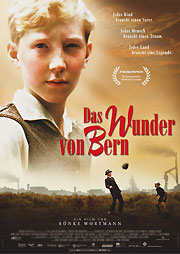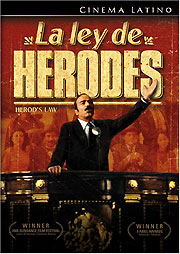November 13, 2006
Language Program to present two-day World Cinema Festival
By Scott Rappaport
The UCSC Language Program will present its own two-day World
Cinema Festival for the campus community on Saturday and Sunday,
November 18 and 19, at Baskin Engineering, Room 152.

Films in German, above, and Spanish, below, are among those being shown at the World Cinema Festival.
|
 |
The event will feature films in 10 foreign languages: Chinese, French, German, Hebrew, Hindi, Italian, Japanese, Portuguese, Russian, and Spanish—all with English subtitles.
Chosen by UCSC’s language instructors, the films will
provide viewers with slices of life around the world—including
youth culture in Brazil, Israel, and Senegal; a spiritual quest
in feudal India; interpersonal relationships in Italy, Japan,
and China; the unexpected effects of a soccer championship in
Germany; and the complexities of politics in Mexico.
“We wanted to expose students to different languages
and cultures,” explained lecturer in Italian Giulia Centineo,
who is coordinating the festival along with lecturer in Portuguese
Ana Maria Seara. “We selected films that had either limited
or no theatrical release in the United States; we were looking
for films that challenged stereotypes and explored significant
aspects of other cultures.”
“Both Ana and I love films and teach film classes on
campus,” said Centineo. “I teach Italian Culture
Through Cinema and she teaches a course in Portuguese cinema.
And I’m always shocked that most of my students have not
seen a foreign film. I want them to actually experience films
produced by people from other countries and hear the actual
language spoken in those countries.”
Centineo noted that at the end of each screening, there will be a question-and-answer period with the instructor who selected the film. Admission is free and limited to UCSC students, staff, and faculty.
“We hope this will be a very educational experience,” she added. “We’ve been thinking of doing it for a long time.”
The schedule includes:
SATURDAY, NOVEMBER 18
2 to 4 p.m.: Chinese
Bian Lian (The King of Masks), Wu Tianming, 1996, 101 minutes. Wang is an old street performer in a remote area of China in the 1930s. A famous master performer of the Sichuan Opera offers to bring him into his act, thus giving Wang fame and possible fortune, but he opts for staying the simple street performer. Then, one night after a performance, he is sold a young boy by a slave trader posing as the boy's parent. "Grandpa" finds new joy in life as he plans to teach "Doggie" (an affectionate term often used for young children in China) his art. All is well until Doggie is found out to really be a girl.
4 to 6 p.m.: French
Ca Twiste a Poponguine (Rocking Poponguine), Moussa Sene Absa, 1983, 90 minutes. This bittersweet coming-of-age comedy is set during the weeks before Christmas, 1964, in a small village on the coast of Senegal, where the local teenagers are divided into rival cultural camps. The "Ins" (or Inseparables) have adopted the names of French pop stars of the time. The Kings, on the other hand, style themselves after African American rhythm and blues legends.
6 to 8 p.m.: German
Das Wunder von Bern (The Miracle of Bern), Sonke Wortman, 2003, 118 min. The title refers to one of the two prime events in the German consciousness during the second half of the 20th century. (The other was the fall of the Berlin Wall in 1989). Brought to their knees by World War II--and essentially citizens of an occupied country existing on foreign aid--Germans rediscovered a measure of self-respect July 4, 1954, when they won the World Cup in Bern, Switzerland. The beginning of the postwar German Economic Miracle is also popularly traced to that date.
8 to 10 p.m.: Hebrew
Films from the Ma’ale School Compilation Two: Best Fiction Films, 85 minutes.
• Aicha (Eicha, Eliezer
Shapiro): Eicha is a young religious girl, whose name
is Hebrew for "Lamentations." Upon reaching 18, she
decides to change her name, establishing her own identity. Will
she succeed?
• Itonim U'frachim (Newspapers & Flowers, Micha Ben Shachar): Carmel is searching for love, but as a religious young woman, it’s not that easy. Will she compromise her religious principles to win love?
• "Hallel" (Hallel, Liat Cohen): Yael Klein, a religious married woman, meets a secular bookshop owner when she accidentally hits his car.
• Pinui (Evacuation Order, Shoshi Grinfild): Chevrona lives all by herself in the West Bank. A couple of soldiers are sent to remove her from her home, but one of them unexpectedly falls in love with her.
10 to midnight: Hindi
The Warrior, Asif Kapadia, 2005, 86 minutes. The story of Lafcadia, a warrior in feudal India who, in something of a spiritual moment, lays down his sword and swears never to kill again. He cuts his hair and sets off on a journey "home" to the mountains. His feudal lord disapproves and demands his head by the next morning. This leads to momentous and tragic events as he begins his trek from the deserts of Rajasthan to the snowbound Himalayas. Lafcadia's journey is a spiritual quest; it’s an attempt to put his violent past and emotional trauma behind and find peace with himself.
SUNDAY, NOVEMBER 19
Noon to 2 p.m.: Italian
Di madre in figlia (From Mother to Daughter), Fabiana Sargentini, 2005, 58 minutes. In her documentary, independent filmmaker Fabiana Sargentini interviews 20 women who answer two questions: "What makes you similar to your mother? What makes your mother similar to you?" Both irreverent and touching, Di madre in figlia received the First Prize at the 2005 Bellaria Film Festival’s Preview of Italian Independent Cinema.
2 to 4 p.m.: Japanese
Tony Takitani, Jun Ichikawa, 2004, 75 minutes. Based on a story by celebrated Japanese author Haruki Murakami, this visually poetic fable tells the story of Tony Takitani, a solitary technical illustrator. Raised as an only child and partially estranged from his father, Takitani is unaware of his own loneliness until he falls in love with Eiko. He soon marries her and comes alive for the first time. But Eiko's obsessive passion for couture leads to tragedy.
4 to 6 p.m.: Portuguese
Uma onda no ar (A Wave in the Air), Helvécio Ratton, 2002, 90 minutes. Based on the true story of four friends who decided to create a pirate radio station called Rádio Favela in a shantytown in 1980s Belo Horizonte, southeast of Brazil. Despite persecution from the local police, the young DJs manage to offer courageous programming, while giving voice to their community’s social issues. The director has referred to it as a “Brazilian fable,” a testimony to the power of free speech.
6 to 8 p.m.: Russian
Dom Durakov (House of Fools) Andrei Konchalovsky, 2003, 108 minutes. Psychiatric patients become entrenched in the Chechen War after the staff leaves to find them a safer hospital. As the war spills into the hospital, it becomes an unexpected haven of sanity and humanity. Based on a true story.
8 to 10 p.m:. Spanish
La ley de Herodes (Herod’s Law) Luis Estrada, 1999, 120 minutes.
This delightful satire takes place in a tiny Mexican town in
1949. "If there is corruption, there is hope” and
“virtue doesn't pay" seem to be the guiding principles
of this movie. Greed, deception, and betrayal are nothing new
in politics. Juan Vargas is the main character, a junkyard operator
who is recruited as a temporary mayor. At first, Vargas is the
ideal politician--he is honest, desperate, and not terribly
ambitious--or so it seems. But Vargas eventually gives in to
overwhelming temptation, bribery, and even violence, in this
brilliant, tongue-in-cheek story about government treachery.